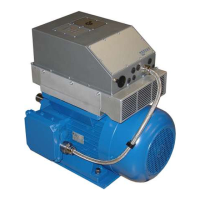
Do you have a question about the Nord Drivesystems SK 750E-751-323-A and is the answer not in the manual?
| Brand | Nord Drivesystems |
|---|---|
| Model | SK 750E-751-323-A |
| Category | DC Drives |
| Language | English |
General safety precautions and information for variable frequency inverters.
Defines the specific applications and limitations for variable frequency inverters.
Instructions for proper installation, cooling, and protection against stress.
Details on electrical safety regulations, conductor cross-sections, and EMC standards.
Details on previous editions and update history of the documentation.
Importance of following operating instructions for proper function and warranty.
Critical safety guidelines for installation and operation of the inverter.
Explanation of the product naming convention and its components.
Essential guidelines for proper wiring to minimize interference and ensure safety.
Details on connecting power supply, motor, brake resistor, and sensors.
Details on Technology Units (ControlBox, Profibus, CANopen, etc.).
Information on optional slide-in modules for digital/analogue signals and bus interfaces.
Details on the handheld ParameterBox for controlling and parameterizing the inverter.
Initial steps for configuring the inverter with basic motor and system data.
Step-by-step guide for basic inverter operation using the ControlBox.
Core parameters for inverter configuration, including frequency and ramp settings.
Parameters for defining motor specifics and V/f curve settings.
Key characteristics of the basic unit: control, mounting, temperature, and protection features.
Lists standard package contents and available accessories like Technology Units.
Crucial safety guidelines for installation, handling live parts, and preventing hazards.
Details on UL, cUL certifications and compliance with the European EMC directive.
Explanation of the product naming convention and its components.
Details on IP54 (air-cooled) and IP65 (water-cooled) protection for the inverter.
Describes mounting the inverter directly on the motor or nearby for integration.
Guidelines for proper device mounting, ensuring sufficient ventilation and clearance.
Provides detailed physical dimensions for different inverter types and wall mounting kits.
Details on wall mounting kits (BG1, BG2) and motor mounting options.
Information on wall-mounting kits for different frame sizes and IP types.
Illustrates dimensions related to wall mounting kits, referencing Section 2.2.
Explains how to mount the inverter on geared motors using specific attachment frames.
Essential guidelines for proper wiring to minimize interference and ensure safety.
General warnings and notes regarding electrical connection procedures.
Details on connecting power supply, motor, brake resistor, and temperature sensor.
Details on connecting the inverter to the mains power supply.
Instructions for connecting the terminals for an electromagnetic brake.
Guidance on connecting external braking resistors for dynamic deceleration.
Specifications for connecting the motor cable, including length limitations.
Information on connecting and using temperature sensors for motor protection.
Details on terminal assignments and cable cross-sections for power supply.
Specifications for connecting optional modules to control terminals.
Details on cable clamp screw types and sizes for different frame sizes.
Overview of optional modules for upgrading the inverter's control and communication capabilities.
Details on Technology Units (ControlBox, PotentiometerBox, Profibus, CANopen, etc.) and their protection types.
Step-by-step instructions for installing Technology Units onto the inverter.
Details on the ControlBox module for parameterization and control, including features and operation.
Explanation of the ControlBox buttons: ON/OFF, selection, value adjustment, and ENTER.
Instructions on controlling the inverter using the ControlBox, including setpoint adjustment.
Methods to access parameterisation mode using the ControlBox for inverter setup.
Graphical representation of the ParameterBox menu hierarchy and navigation.
Details on the PotentiometerBox for controlling functions, its operating elements, and LEDs.
Information on the DeviceNet module for industrial automation systems communication.
Details on the Profibus module for serial communication in automation systems.
Information on the CANopen module for device control and parameterization.
Details on the InterBus module for data exchange in automation systems.
Information on the AS Interface for simple field bus level communication.
Describes the kit for upgrading SK 300E technology units and protecting the inverter.
Details on optional slide-in modules (Basic I/O, Standard I/O, Multi I/O, CANbus, Profibus).
Step-by-step guide for installing customer interface modules into the inverter.
Instructions for safely removing custom interface modules from the inverter.
Details on the Basic I/O interface, its connectors, functions, and parameters.
Information on the Standard I/O interface, including terminals, functions, and parameters.
Details on the Multi I/O interface for enhanced digital and analogue signal processing.
Information on the Multi I/O 20mA interface for analogue current output.
Details on CANbus and Profibus interfaces for system integration.
Details on extension units (Encoder, PosiCon) for high-precision speed and position control.
Step-by-step guide for installing special extension units into the inverter.
Instructions for safely removing special extension modules from the inverter.
Details on the Encoder I/O extension for high-precision speed control.
Information on the PosiCon I/O extension for positioning control.
Terminal assignments for various customer interfaces and special extensions.
Details on serial interface connections (RS485, CAN, Profibus).
Connection specifications for incremental encoders (TTL, RS 422).
Connection specifications for SSI absolute value encoders.
Wiring details for connecting incremental encoders to SK XU1-ENC and PosiCon.
Overview of the handheld ParameterBox for inverter operation and data management.
Overview of the panel-mounting ParameterBox for permanent installation.
Introduction to NORD CON software for inverter control and optimization.
Illustrates different connection types and their corresponding operating elements.
Detailed description of the SK PAR-2H handheld ParameterBox.
Details on the SK PAR-2E panel-mounting ParameterBox and its installation.
Step-by-step guide for mounting the ParameterBox onto control cabinets.
Explains the electrical connection for the SK PAR-2E ParameterBox.
Instructions for setting the language on the ParameterBox.
Description of the ParameterBox display modes and information shown.
Explanation of ParameterBox buttons and their functions for operation.
Detailed steps for controlling the inverter using the ParameterBox.
Graphical representation of the ParameterBox menu hierarchy and navigation.
Instructions on accessing and modifying parameters using the ParameterBox.
Explanation of the ParameterBox screen layout during parameter editing.
Overview of ParameterBox parameters grouped by menu (Display, Parameterisation, Management, Options).
List of ParameterBox error codes, their types, causes, and remedies.
Instructions for connecting the ParameterBox to a PC for data management.
Introduction to NORD CON PC software for controlling NORDAC frequency inverters.
Key functionalities of the NORD CON software, including parameter management and oscilloscope.
Explanation of how NORD CON enables remote control of the inverter.
Details on using the oscilloscope function for drive configuration analysis.
How to read, change, store, and print inverter parameters using NORD CON.
Using NORD CON macros to develop process sequences for system start-up.
Overview of inverter readiness for operation and parameter adjustment.
Configuring basic motor data and executing automatic stator resistance measurement.
Step-by-step guide for basic inverter operation using the ControlBox.
Setting up the inverter for control via digital and analogue inputs with a customer interface.
Core parameters for inverter configuration, including frequency and ramp settings.
Parameters for defining motor specifics and V/f curve settings.
Parameters for scaling I/O, assigning functions, and defining PID controllers.
Parameters for interfaces, pulse frequency, fault acknowledgement, and other functions.
How array parameters are displayed and selected on the ParameterBox.
Explanation of how to display and select operational values on the ParameterBox.
Details on parameters like Parameter Set, Copy Parameter Set, Acceleration/Deceleration Time.
Details on Minimum Frequency, Maximum Frequency, and Ramp Smoothing parameters.
Details on Brake Reaction Time, Disconnection Mode, and DC Brake Current parameters.
Explains Disconnection modes, DC brake current, and time parameters.
Details on Torque precontrol, Torque current limit, Jog frequency, and Brake delay off.
Parameters for selecting motor type and inputting motor data.
Details on Cos phi, Star/Delta connection, Stator resistance, and No Load current.
Parameters for Static boost, Dynamic boost, Slip compensation, and Torque precontrol.
Parameters related to Servo mode, Incremental encoder, and Speed controller.
Parameters for Torque control, Field control, and Field weakening.
Parameters for Speed controller, Function encoder, and Ratio encoder.
Parameters for Digital Input 13, including Servo ctrl and Sense supervision.
Functions for Analog Input 1, including PID, frequency addition/subtraction, and torque control.
Details on Analog Input 1 modes: limited, unlimited, and controlled.
Settings for Analog Input 1, including voltage adjustments and phase sequence reversal.
Parameters for Analog Input 2 functions, modes, and adjustments.
Details on PID control parameters and ramp settings for PI setpoint.
Functions for Analog Output 1, including modes and scaling.
Digital functions for Analog Output 1 and settings for Analog Output 2.
Details on Digital Inputs 1 through 6 and their programmable functions.
List of functions assignable to digital inputs (P420-P425).
Parameters for Quick Stop time, Quick Stop on Error, and Automatic Starting.
Parameters for Fixed Frequency settings (1-5).
Details on Relay 1 and Relay 2 functions, scaling, and hysteresis.
Parameters for Analog Output 2 and normalization.
Parameters for Bus I/O functions, including Input Bits and Output Bits.
Parameters for Flying Start, resolution, offset, and factory settings.
Parameters for Chopper settings, Braking resistor, and Flux delay.
Parameters for DC Run-on time, Save on EEPROM, and PosiCon.
Parameters for USS baud rate, USS address, and CANbus baud rate.
Parameters for Skip frequency, Flying start, and Factory settings.
Parameters for Current limit, Pulse Disconnection, and Check input voltage.
Parameters for Mode phase sequence and Set relays.
Parameters for Set analog out, Bus actual value, and Function bus-setpoint.
Parameters for Function bus-setpoint and Pot Box Function.
Parameters for Back up data record, Drive profile, and Pot Box Function.
Parameters for Chopper settings, Braking resistor, and Flux delay.
Parameters for current fault, last faults, and frequency errors.
Parameters for current, voltage, and relay status.
Parameters for operating time, running time, frequency, speed, and current.
Parameters for voltage, current components, cos phi, and power.
Parameters for Input Voltage, Torque, Field, Parameter set, and phase currents.
List of operational values that can be displayed.
List of essential parameters for inverter configuration.
Parameters related to motor data and voltage/frequency characteristic curves.
List of control parameters for encoder options.
List of parameters for controlling the inverter via terminals.
List of additional parameters for inverter configuration.
Parameters specific to the PosiCon positioning control module.
List of parameters for displaying current state and values.
List of error messages, their types, causes, and recommended actions.
Key specifications including frequency, overload capacity, control types, and temperature.
Electrical specifications for 230V mains supply, including motor rating and output current.
Electrical specifications for 400V mains supply, including motor rating and output current.
Electrical data specific to UL/cUL approval requirements.
Diagram explaining how main and secondary setpoints are processed.
Block diagram illustrating the setpoint generation process including PID controller.
Diagram showing the PID controller's role in setpoint ramp generation.
Detailed view of the PID controller components (P, I, D) and frequency ramp.
Explanation of the PI process controller for limiting output and scaling to master setpoint.
Illustrates a practical example of a process controller application.
Details specific parameter settings for process controller functionality.
Information on EMC directives, conformity declarations, and technical documentation.
Explanation of EMC limit value classes for interference emission and immunity.
Details on EMC limit values according to EN 50081/50082 standards.
Wiring recommendations to meet EMC standards, including motor cable shielding.
Guidelines for device maintenance, cleaning, and contacting technical support.
Information on accessing the comprehensive manual online.
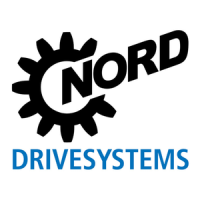



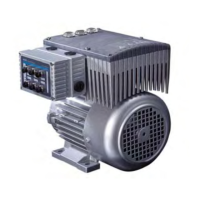





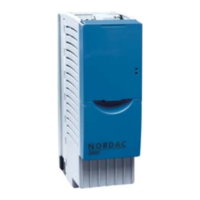
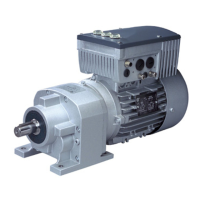
